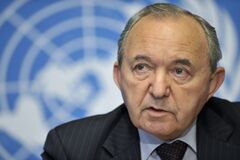Richard Goldstone
(Judge, lawyer) | |
|---|---|
 | |
| Born | Richard Joseph Goldstone 26 October 1938 |
| Member of | "The New Humanitarians", Hammarskjöld Commission, Integrity Initiatives International |
Richard Goldstone is a South African former judge. After working for 17 years as a commercial lawyer, he was appointed by the South African government to serve on the Transvaal Supreme Court from 1980 to 1989 and the Appellate Division of the Supreme Court of South Africa from 1990 to 1994.
He is considered to be one of several liberal judges who issued key rulings that undermined apartheid from within the system by tempering the worst effects of the country's racial laws. Among other important rulings, Goldstone made the Group Areas Act – under which non-whites were banned from living in "whites only" areas – virtually unworkable by restricting evictions. As a result, prosecutions under the act virtually ceased.
Contents
Transition from apartheid
During the transition from apartheid to multiracial democracy in the early 1990s, he headed the influential Goldstone Commission investigations into political violence in South Africa between 1991 and 1994. Goldstone's work enabled multi-party negotiations to remain on course despite repeated outbreaks of violence, and his willingness to criticise all sides led to him being dubbed "perhaps the most trusted man, certainly the most trusted member of the white establishment" in South Africa. He was credited with playing an indispensable role in the transition and became a well known public figure in South Africa, attracting widespread international support and interest.[1]
Prosecuting war crimes
Goldstone's work investigating violence led directly to his being nominated to serve as the first chief prosecutor of the United Nations International Criminal Tribunal for the former Yugoslavia and for Rwanda from August 1994 to September 1996. He prosecuted a number of key war crimes suspects, notably the Bosnian Serb political and military leaders, Radovan Karadžić and Ratko Mladić. On his return to South Africa he took up a seat on the newly established Constitutional Court of South Africa, to which he had been nominated by President Nelson Mandela. In 2009, Goldstone led a fact-finding mission created by the UN Human Rights Council to investigate international human rights and humanitarian law violations related to the Gaza War (2008–09).[2] The mission concluded that Israel and Hamas had both potentially committed war crimes and crimes against humanity, findings which sparked outrage in Israel and the initiation of a personal campaign against Goldstone. In 2011, in the light of investigations by the Israeli forces which indicated that they had not intentionally targeted civilians as a matter of policy, Goldstone wrote that if evidence which had been available later had been available at the time, the Goldstone Report would have been a different document.[3]
Hammarskjöld Commission
Richard Goldstone was one of four members of the Hammarskjöld Commission which was asked to look at all the available evidence and report on whether it justified the United Nations reopening its inquiry into the cause of death of UN Secretary-General Dag Hammarskjöld, pursuant to General Assembly resolution 1759 (XVII) of 26 October 1962.
The 61-page Hammarskjöld Commission report was presented on 9 September 2013 in the Historical Reading Room of the Peace Palace at The Hague in the Netherlands to the Chairman of the Hammarskjöld Inquiry Trust (Lord Lea of Crondall).[4] This was followed by a media Q & A session with all four members of the Commission, who were present at the meeting:
- The Rt. Hon. Sir Stephen Sedley (Chairman)
- Ambassador Hans Corell
- Justice Richard Goldstone
- Justice Wilhelmina Thomassen[5]
Conclusions
The report's conclusions at paragraph 15.1 stated:
- We reiterate that the foregoing report, albeit detailed, contains no more than a selection from what is now a very large body of evidence, all of which we have considered in the course of our work.
- Much of it has become known only in recent years, and it is still capable of being added to – indeed it has been augmented during the writing of this report.
- This alone, without embarking on the limitations of the three original inquiries, answers the initial question: does significant new evidence about Dag Hammarskjöld’s death exist?
- Undoubtedly it does.[6]
Related Document
| Title | Type | Publication date | Author(s) | Description |
|---|---|---|---|---|
| Document:Goldstone: An act of negligence | Article | 4 April 2011 | Noura Erakat | Downplay of Israeli aggression towards civilians during the Gaza War, causes scholars to question Richard Goldstone. Regardless of what may have been his best intentions, Goldstone has negligently, one hopes not deliberately, undermined the laws of armed conflict and emboldened those states, like Israel, who believe that it is a surmountable nuisance. |
References
- ↑ "Cape Town Journal; In a Wary Land, the Judge Is Trusted (to a Point)"
- ↑ "UN appoints Gaza war-crimes team"
- ↑ "Reconsidering the Goldstone Report on Israel and war crimes"
- ↑ "Report of the Hammarskjöld Commission"
- ↑ "Presentation Hammarskjöld Commission Report"
- ↑ "The Dag Hammarskjöld Commission report" The South African Foreign Policy Initiative (SAFPI)
Wikipedia is not affiliated with Wikispooks. Original page source here